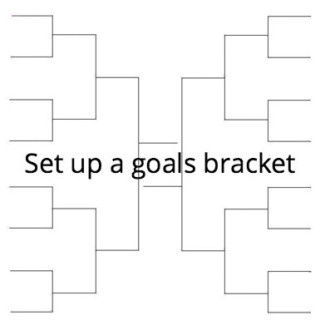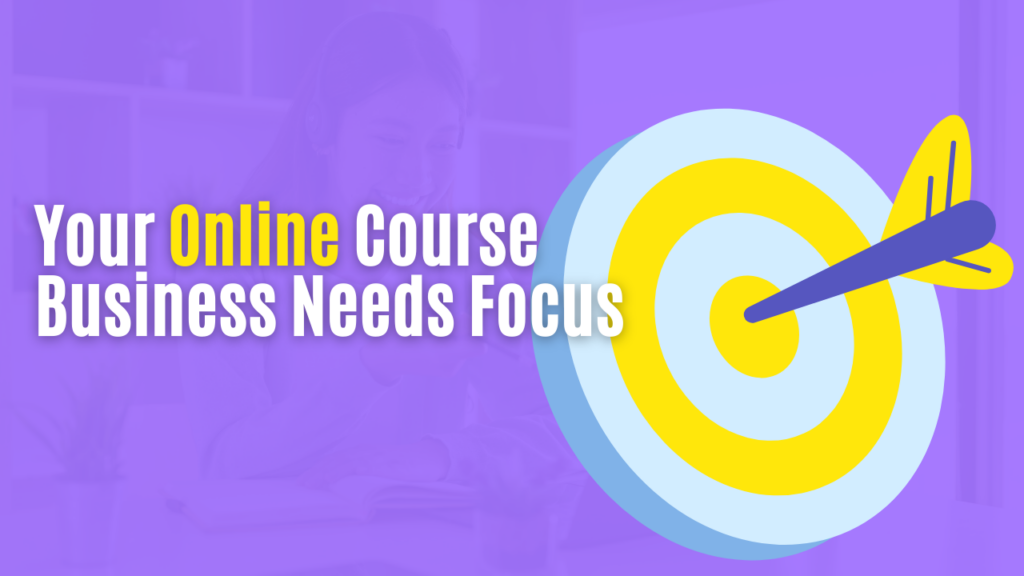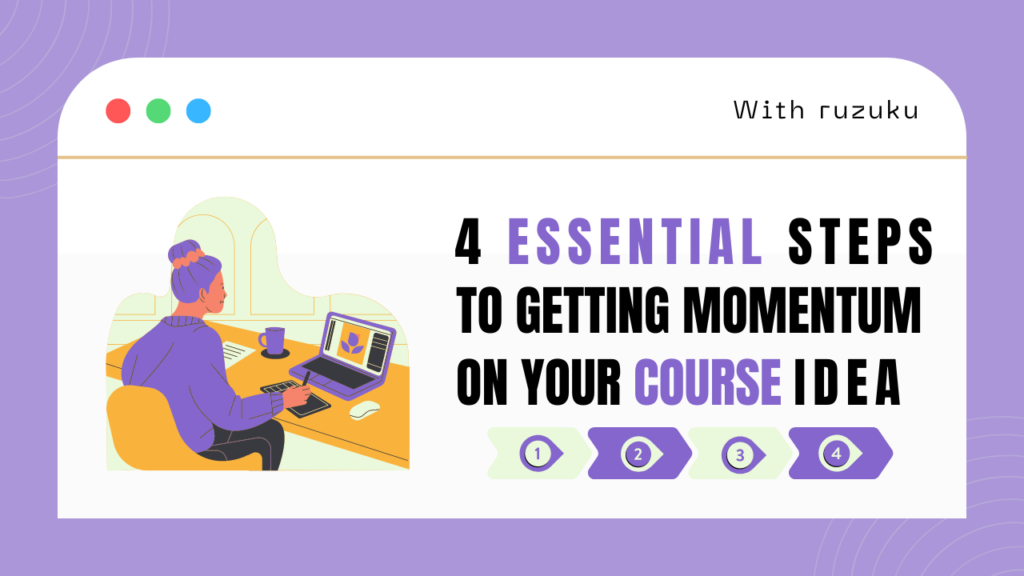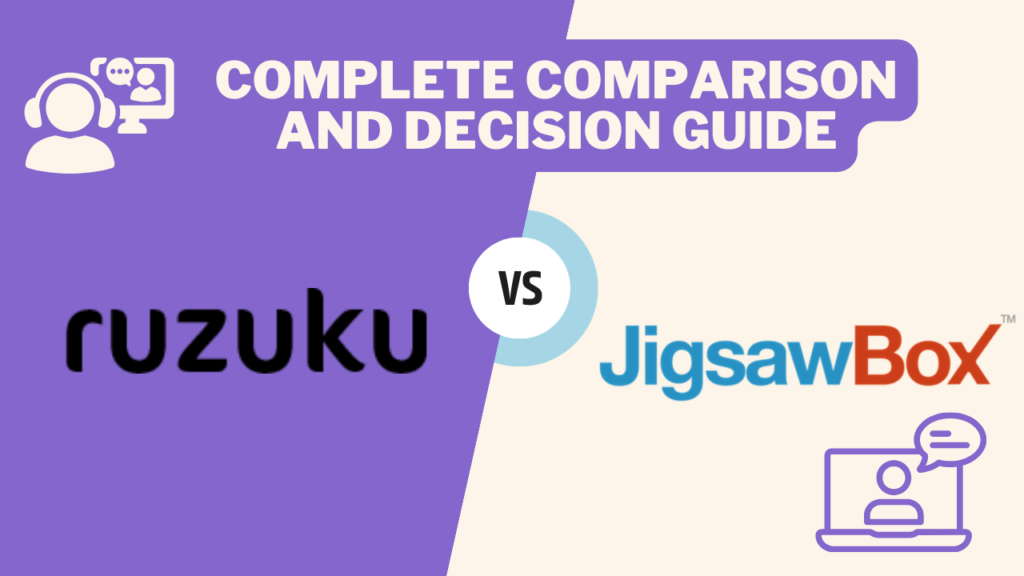It’s the curse of the entrepreneur:
You have all the ideas! Maybe even too many ideas!
Sometimes it seems like your brain might be trying to hijack your business success, because every time you sit down to focus on a business task, a new idea pops into your head.
And, let’s be honest… new shiny ideas are far more exciting than the hard work of implementing an idea you’re already working on.
So what does your course-based business really need?
Focus.
Now, it’s easy for us to say that, but we also know that focus comes along with its own challenges.
How do you narrow down your ideas?
What do you do with all the ideas that pop up in your head?
Turns out, there are a couple of steps that you can take to move past distraction.
Interested in finally breaking out of the shiny object cycle? Read on.
Amanda Genther — Focus on how you can help one person
Last year we interviewed Amanda, an online course design and launch expert, to get her take on what to do when you have so many ideas flying around in your head that you don’t know where to start.
She believes that having “too many” ideas isn’t necessarily a bad thing. It indicates a high level of creativity, and it probably means that you’re really good at brainstorming, too.
But she cautions us that when you don’t move beyond the phase of having ideas, then you never give yourself the chance to follow through on any of them.
Her advice?
You just need to create something that helps at least one person. If you can help 10 people, even better.
One of the things that always stops me in my tracks is resistance and this feeling of wanting to pack everything I know into every offering. What happens then, though, is you end up with something that isn’t specific enough to understand.
Before, every time I got a new brilliant idea, I’d want to act on it immediately. That meant that the project I was working on got pushed to the back burner.
Now, I tell myself that “It’s not a now thing“.
Every time I get a new idea, I write it down. And then once a month I review my idea notebook and add the still good ideas to an Evernote folder. Then, I review my next 3-6 months to decide what ideas I want to focus on.
 David Allen calls this a “Someday/Maybe” list. You can add as many ideas as you want to your Someday/Maybe list. It’s free, it’s fun, and it lets your brain relax and keeps your focus on Priority #1.
David Allen calls this a “Someday/Maybe” list. You can add as many ideas as you want to your Someday/Maybe list. It’s free, it’s fun, and it lets your brain relax and keeps your focus on Priority #1.
And Amanda has a recommendation on how to pick your top priority. She says, “my favorite way is to choose the one idea that you can easily get out there in the shortest amount of time. … once you’re gotten good at following through on the small ideas, you’ll be more prepared to take on the larger projects.”
Since focus is such a big hurdle for online entrepreneurs, we also scoured the web for more wise advice about how to narrow your focus down to just one big thing.
Here’s what the other experts have to say.
ElegantHack — Your course is not a checkbox
Christina at ElegantHack says that “your product is not a grocery list, completed when everything on the feature list has been checked off. Your product must be a bridge between your customers and their dreams.”
Similar to Amanda’s advice about helping just one person, you also need to make sure that you’re really giving the people who take your course something that’s going to change their lives.
Michelle Warner — It’s not “no.” It’s “not now.”
Michelle writes in this Huffington Post article that “successful entrepreneurs understand that by focusing on one idea or one business at a time they’re not saying ‘no,’ instead they’re saying ‘not now.’ They choose one viable project at a time, see it to maturity and then move on to their next idea or passion.”
We love the idea of “not now” — it feels less restrictive, while also making sure that you can make forward progress with your number one priority.
Caleb Wojcik — Beat idea overwhelm
 Caleb says, “if you’re like me and many other entrepreneurs that I know, your mind never stops coming up with new ideas for your business. This leads to one of the biggest mistakes that entrepreneurs make: before too long they are overwhelmed by how many projects they have going at once.”
Caleb says, “if you’re like me and many other entrepreneurs that I know, your mind never stops coming up with new ideas for your business. This leads to one of the biggest mistakes that entrepreneurs make: before too long they are overwhelmed by how many projects they have going at once.”
His advice to entrepreneurs? He actually recommends quitting more often.
Neil Patel — Have a list of someday goals
Neil asks us, “what’s the one thing that you need to do right now? If you want to be successful, you’re going to have to decide on that one thing and do it. Write it down. That’s your plan for today. You’re allowed to have as many someday goals as you want, but for today, you need to work on just one thing.”
He cautions that “brilliance can turn into burnout, and creative energy can drift into distraction” and suggests that we might even accidentally end up pushing really amazing ideas aside in favor of a new, uncertain idea.
Noah Kagan — Have one big goal
In this powerful article, Noah says,”when you are running your business, have one goal. That’s it.”
It seems really simple, but it works. This is the advice he learned from his time as an employee at Facebook, and the advice he gave to Ramit Sethi as Ramit was getting I Will Teach You To Be Rich off the ground.
Aly Juma — Don’t chase any other ideas
Looking back at your business, Aly writes that, “if you see a path of destruction in your past, full of started – but never finished – projects and ideas, it may be a sign that you’re getting a little too carried away with what’s new. In these situations, you must realize that chasing another idea isn’t the answer, but rather executing on the current ones and learning how to finish is.”
Steve Tobak — Finishing matters
In this Entrepreneur.com article, Steve asks us, “since when is starting anything an accomplishment? Starting anything is relatively easy. It has little value. It’s finishing that matters. Growing. Accomplishing. Achieving. Results. In a business, that means delivering value to customers, employees, and shareholders.”
In the case of your course-based business, it means delivering value and results to your course participants.
Leo Babauta — Subtract
 Leo is probably one of the best people to talk to when it comes to focus and keeping your life simple. He asks you to think about the following questions:
Leo is probably one of the best people to talk to when it comes to focus and keeping your life simple. He asks you to think about the following questions:
“What do you really want to do right now? What’s most important? What kind of person do you want to be? Maybe you have 5 things you want to do. Pick one. Subtract.”
James Clear — You don’t need more information
James is one of the foremost experts on taking things from theory and putting them into practice. In this actionable article, he writes:
Everyone wants to know the right time to simplify and focus on one thing, but nobody does. That’s what makes success so hard. Entrepreneurship isn’t like baking a cake. There is no recipe. There is no guidebook. At this stage your best option is to decide. You can’t try everything.
At some point, you don’t need more information, you just need to make a choice.
Todd Herman — Set up a goals bracket
One other fun way to narrow down your ideas to the “one” you’re going to focus on right now is to build out an NCAA-style goals bracket. This idea comes from Todd Herman, also known for his 90 Day Year project.
 To start, line up all of your ideas at random at the edges of your bracket. Then it’s as simple as choosing between sets of ideas until you find yourself with the winner!
To start, line up all of your ideas at random at the edges of your bracket. Then it’s as simple as choosing between sets of ideas until you find yourself with the winner!
You can also document and save your other ideas for later (especially the top four or five from the bracket).
So what’s your ONE idea?
Let’s imagine into the future for a moment: you have narrowed all the ideas down to a single idea that you’re working on.
You have limited your distractions, and you’re no longer getting pulled in five different directions by new shiny ideas.
How freeing would that be? Our bet is that it would be both relaxing and energizing, all at the same time.
So let’s get to it.
Pick one of the great methods outlined in this post, and figure out your top priority.
Then the real fun can begin!
And be sure to grab the Roadmap to $5K if you haven’t already — you can use it start moving on your single, focused idea that will generate course revenue for your business!





4 Responses
More than anything I find the amount of tasks which I need to undertake everyday. In order for my one idea to succeed. The most distracting and time consuming part. Almost 2.5 years into my idea and still not makings a living. When does an entrepreneur say enough is enough. When others around tell you it’s a great idea. But how does it make money? I dunno, great idea though right ?
We totally get it. The conventional advice tells you that you have to do ALL the things to get your idea and business off the ground – and it’s just plain overwhelming. Make sure you read next week’s post – we’re going to talk about this exact issue! Thanks for voicing what’s going on with you, and I hope that we can help you simplify and succeed.
I feel that my website does not educate parents of the value of my products/services in comparison to 100s of other math games that are out there. I received a notice of a Principal who opened one of my courses. She is interested in using our math course for Summer School. How do I send a thank you with more information how her teachers can use the courses? I wish I had a landing page in place that was more information. I am interested in webinars but when I tell them to go to the Webpage I never hear from them again. I am impressed with landing pages and signed up with them and want to know more about how to do them. I am through lesson 10 of 30 Page Course Creation Challenge. I need to post on Social Media Sites. My 30 days are not consecutive. I’ll try to do better.
Evelyn
Hey Evelyn! Sounds like you have a lot going on. First, congratulations on the interest in using your course for summer school!
It sounds like in this case, opening up a dialogue with them is a good first step. Rather than sending them to a landing page (which means a whole bunch of work for you to get ready), you could set up a time to have a Skype call with them, where you could present your ideas for how they could use the course, and they could ask you any questions that they have.
You could record the call, and then use the conversation as a basis for what kind of information you would use when eventually setting up your landing page (if you see that being a repeated question in the future).
I’d say to keep it simple to start with – don’t get overwhelmed with the technology or a huge list of stuff you feel like you “should” be doing. One thing at a time, and only the things that are actively moving your business forward! Good luck!